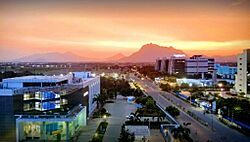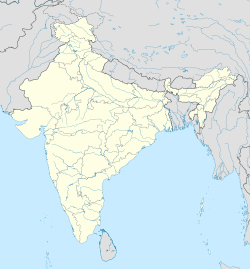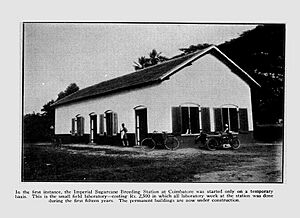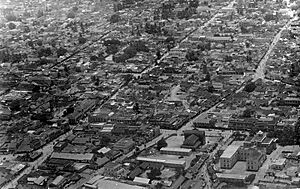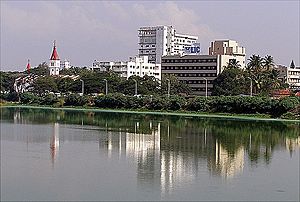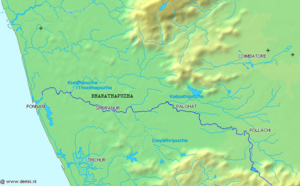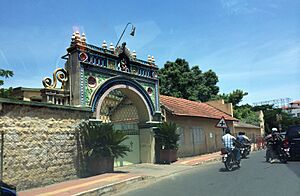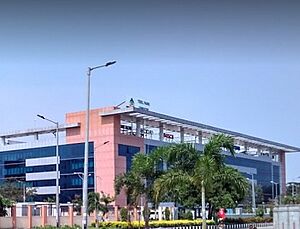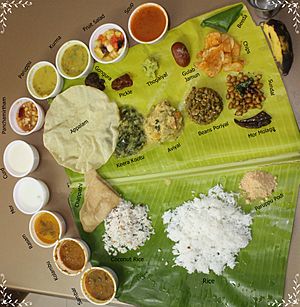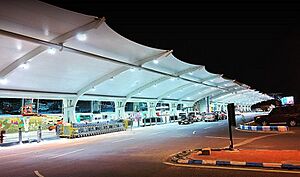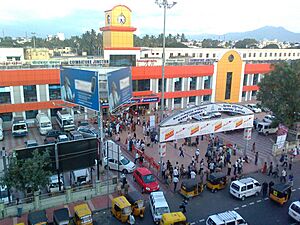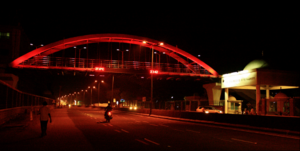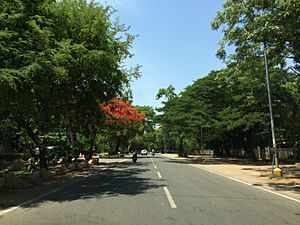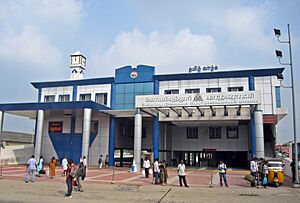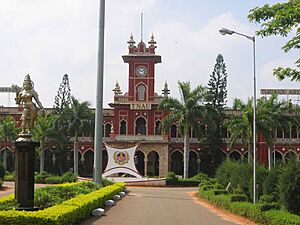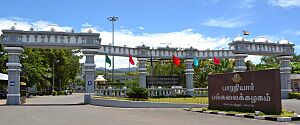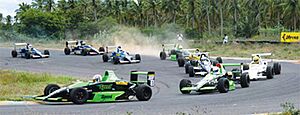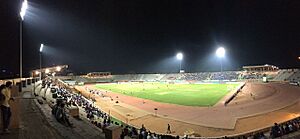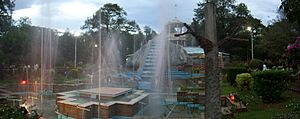Coimbatore facts for kids
Quick facts for kids
Coimbatore
Kovai
|
|
|---|---|
|
Clockwise from top: A business district; Maruthamalai Murugan Temple; Coimbatore Medical College; Victoria Town Hall; TIDEL Park Coimbatore; Coimbatore International Airport; and Perur Pateeswarar Temple
|
|
| Nickname(s):
Kovai, Manchester of South India
|
|
| Country | |
| State | |
| District | Coimbatore |
| Government | |
| • Type | Municipal Corporation |
| • Body | CCMC |
| Area | |
| • Metropolis | 257.04 km2 (99.24 sq mi) |
| • Metro | 696.25 km2 (268.82 sq mi) |
| Area rank | 2 |
| Elevation | 427 m (1,401 ft) |
| Population
(2011)
|
|
| • Metropolis | 1,601,438 |
| • Rank | 24th |
| • Density | 6,441/km2 (16,680/sq mi) |
| • Metro | 2,136,916 |
| • Metro rank | 16th |
| Demonym(s) | Coimbatorean |
| Languages | |
| • Official | Tamil, English |
| Time zone | UTC+5:30 (IST) |
| PIN |
641XXX
|
| STD Code | +91-0422 |
| Vehicle registration | TN 37 (South), TN 38 (North), TN 66 (Central), TN 99 (West), TN 37Z (Sulur) |
| Population Note: The population as per 2011 census calculated basis pre-expansion city area of 105.60 sq.km. was 1,050,721. Post expansion of city limits to 257.04 sq.km., the population including the new city limits was provided by Government of India for the smart city challenge was 1,601,438. The 2011 census data for the urban agglomeration is available and has been provided. | |
Coimbatore, also known as Kovai, is a big city in the Indian state of Tamil Nadu. It sits by the Noyyal River and is surrounded by the Western Ghats mountains. Coimbatore is the second largest city in Tamil Nadu by population, after Chennai. It is also the 16th largest group of cities in India. The city is the main center for the Coimbatore District and is managed by the Coimbatore Municipal Corporation, which started in 1981.
The area around Coimbatore was ruled by the Chera dynasty long ago, between the 1st and 4th centuries CE. It was an important trade route connecting the west coast and Tamil Nadu. Later, the medieval Cholas and the Vijayanagara Empire ruled the region. In the 18th century, it came under the Kingdom of Mysore. After some wars, the British East India Company took control in 1799.
In 1804, Coimbatore became the capital of the new Coimbatore district. In 1866, it became a municipality. The city grew quickly in the early 1900s because of its textile industry. After India became independent, Coimbatore continued to grow. Today, it is a major exporter of jewellery, wet grinders, poultry, and auto parts. The city is often called the "Manchester of South India" because of its large textile industry.
Coimbatore is known as one of the best emerging cities in India. It is also considered one of the safest cities for women. The Indian government has chosen Coimbatore to be developed as a smart city.
Contents
- What's in a Name?
- A Look Back in Time
- Where is Coimbatore?
- Weather in Coimbatore
- People of Coimbatore
- Coimbatore's Economy
- Culture and Life
- Getting Around Coimbatore
- Education in Coimbatore
- City Services
- Fun and Sports
- Environmental Efforts
- Famous People from Coimbatore
- International Connections
- Images for kids
- See also
What's in a Name?
The name "Coimbatore" might come from "Kōvanpuddur," which means "new town of Kovan." Kovan was a local leader or chieftain. Over time, this name changed to "Kōyamputtūr" and then to "Coimbatore." Another idea is that the name comes from "Kovaiamma," a goddess worshipped by Kovan's people.
A Look Back in Time
The area around Coimbatore was important for trade during the Sangam period (around 1st to 4th centuries CE). It was a gateway to the Palakkad Gap, a key path for traders between the west coast and Tamil Nadu. An old Roman trade route also passed through this region.
In the 10th century, the medieval Cholas took over the Kongu Nadu area. A Chola highway, called Rajakesari Peruvazhi, went through the region. By the 15th century, much of Tamil Nadu was under the Vijayanagara Empire. Later, the Madurai Nayaks ruled and divided the Kongu Nadu region into 24 Palayams (towns).
In the late 1700s, the region became part of the Kingdom of Mysore. After some battles, the British East India Company took control in 1799. Coimbatore played a role in the Second Poligar War in 1801, led by Dheeran Chinnamalai.
On November 24, 1804, Coimbatore became the capital of the new Coimbatore district. In 1866, it was made a municipality. The city faced tough times during the Great Famine of 1876–78. In the early 1900s, the cotton industry in Mumbai declined, which helped Coimbatore's textile industry grow a lot.
Coimbatore was also important during the Indian independence movement. Leaders like Mahatma Gandhi visited the city. After India gained independence, Coimbatore grew rapidly due to new industries. In 1981, it became a municipal corporation.
Where is Coimbatore?
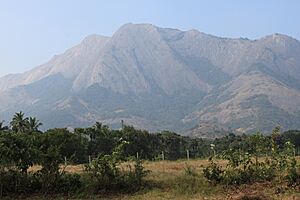
Coimbatore is located in south India, about 427 meters above sea level. It sits on the banks of the Noyyal River in northwestern Tamil Nadu. The city covers an area of about 642 square kilometers. It is surrounded by the Western Ghats mountains to the west and north. These mountains have reserve forests that are part of the Nilgiri Biosphere Reserve.
The Noyyal River forms the city's southern border. Coimbatore has many lakes and wetland areas that are fed by the river and rainwater. Some of the major lakes are Singanallur Lake, Valankulam Lake, and Ukkadam Periyakulam.
The city has two main geographic parts: a dry eastern side where most of the city is, and a western side near the Nilgiris and Anaimalai mountains. The Palghat Gap, a mountain pass connecting Kerala to Tamil Nadu, is to the west.
Because it's in the Western Ghats, a UNESCO World Heritage Site, Coimbatore has a lot of different plants and animals. Its wetlands are home to about 116 types of birds, including migratory birds like the spot-billed pelican and painted stork. You can also find Indian elephants, wild boars, leopards, and Bengal tigers in the region.
The northern part of the city has thick tropical evergreen forests with trees like teak and sandalwood. The soil is mostly black, which is good for growing cotton.
Weather in Coimbatore
Coimbatore has a hot, semi-dry climate. It has a wet season from September to November because of the northeast monsoon. Summers are hot and humid, from March to June, with temperatures usually between 25°C and 38°C. The monsoon season starts in July and lasts until October. The city gets some rain from the southwest monsoon and sometimes heavy rain from the northeast monsoon.
Winter is from November to February, with temperatures between 20°C and 30°C. The average yearly rainfall is about 600 millimeters. Even with this rain, the city needs extra water from the Siruvani River and Pilloor during drier months.
People of Coimbatore
| Historical population | ||
|---|---|---|
| Year | Pop. | ±% |
| 1871 | 35,310 | — |
| 1881 | 38,967 | +10.4% |
| 1891 | 46,383 | +19.0% |
| 1901 | 53,080 | +14.4% |
| 1911 | 47,000 | −11.5% |
| 1921 | 68,000 | +44.7% |
| 1931 | 95,000 | +39.7% |
| 1941 | 130,348 | +37.2% |
| 1951 | 198,000 | +51.9% |
| 1961 | 286,000 | +44.4% |
| 1971 | 356,000 | +24.5% |
| 1981 | 704,000 | +97.8% |
| 1991 | 816,321 | +16.0% |
| 2001 | 930,882 | +14.0% |
| 2011 | 1,601,438 | +72.0% |
Sources:
|
||
Coimbatore has a population of over 1.6 million people. It is the second largest city in Tamil Nadu. Most people in Coimbatore are Tamils. There are also many Telugus, Kannadigas, Malayalis, and people from North India, especially Gujaratis.
| Religion in Coimbatore (2011) | ||||
|---|---|---|---|---|
| Religion | Percent(%) | |||
| Hindu | 83.3 % | |||
| Muslim | 8.6 % | |||
| Christian | 7.5 % | |||
| Other or not stated | 0.6 % | |||
Most of the city's population follows Hinduism. There are also many Muslims and Christians. Small numbers of Jains, Sikhs, and Buddhists live here too.
The official language is Tamil. A local dialect called Kongu Tamil is mostly spoken. Other languages spoken include Telugu, Kannada, and Malayalam.
Coimbatore's Economy
Coimbatore is a big center for manufacturing, education, and healthcare in Tamil Nadu. It is one of the fastest-growing cities in India. The city has over 25,000 small, medium, and large businesses. The main industries are engineering and textiles. Coimbatore is known as the "Manchester of South India" because of its huge textile industry, which uses cotton from nearby fields.
The city also has a large trade fair ground called CODISSIA, built in 1999. Coimbatore is home to many textile mills and research centers like the Sardar Vallabhbhai Patel International School of Textiles & Management. The Kovai Cora Cotton saree is a special product from this region.
Coimbatore is the second largest producer of software in Tamil Nadu, after Chennai. IT parks like TIDEL Park Coimbatore have helped the city's IT and Business process outsourcing industries grow.
The city is a major center for making auto parts in India. Big car makers like Maruti Udyog and Tata Motors get many of their parts from Coimbatore. G.D. Naidu developed India's first local motor here in 1937. The city also makes about 75% of India's wet grinders, which are kitchen appliances. The "Coimbatore Wet Grinder" is a famous product.
Coimbatore is also called "the Pump City" because it provides almost half of India's motors and pumps. It is a big exporter of jewellery, especially diamond cutting and machine-made jewelry. The city has many poultry farms and is a major producer of chicken eggs.
Culture and Life
Coimbatore and its people are known for being good at starting businesses. The city is a mix of traditional and modern. The World Classical Tamil Conference 2010 was held here. Coimbatore is often listed among the top 10 best cities to live in India. November 24, the day Coimbatore became a district, is celebrated as "Coimbatore Day."
Food in Coimbatore
Coimbatore's food is mostly south Indian, with rice as the main ingredient. Many local restaurants still serve food on a banana leaf, which is an old custom. Dishes like Idly, dosa, paniyaram, and appam are very popular.
Coimbatore has a lively street food scene. Arisi paruppu sadam, a mix of lentils and rice, is a special dish from this area. Kaalaan, made from deep-fried mushrooms in a spicy sauce, is another popular street food.
Arts and Entertainment
Swamikannu Vincent built the first cinema in south India in Coimbatore. He also started the idea of Tent Cinema, where movies were shown in a tent on open land. Later, big film studios like Central Studios and Pakshiraja Studios were set up here.
The city has its own music festival every year. Art, dance, and music shows are held in September and December. Coimbatore also has several museums and art galleries, such as the G.D. Naidu Museum and the Gass Forest Museum.
Getting Around Coimbatore
By Air
The city has the Coimbatore International Airport, located about 10 kilometers from the city center. It started in 1940. The airport was upgraded in 1987 to handle bigger planes. In 2012, it was made an international airport. It has flights to major Indian cities and some international places like Sharjah and Singapore.
The Sulur Air Force Station, near Sulur, is an air base for the Indian Air Force. It is home to transport planes and helicopters.
By Train
Train service in Coimbatore began in 1861. Coimbatore is on a major railway line connecting Kerala with the rest of India. The main train station is Coimbatore Junction, which is one of the busiest in South India. Other stations in the city include Coimbatore North Junction and Podanur Junction.
Metro Rail Plans
There are plans to build a metro rail system in Coimbatore. The government is studying the best routes for this new transport system.
By Road
Coimbatore has six main roads: Avinashi Road, Trichy Road, Sathy Road, Mettupalayam Road, Palakkad Road, and Pollachi Road. The Coimbatore bypass helps connect different national and state highways around the city.
There are five National Highways that pass through Coimbatore:
| Highway Number | Destination | Via |
|---|---|---|
| 544 | Salem | Perundurai, Chithode |
| Kochi | Palakkad, Thrissur | |
| 948 | Bangalore | Kollegal, Chamrajnagar |
| 81 | Chidambaram | Karur, Tiruchirappalli |
| 181 | Gundlupet | Mettupalayam, Ooty |
| 83 | Nagapattinam | Pollachi, Udumalaipettai, Palani, Oddanchatram, Dindigul, Tiruchirappalli, Thanjavur |
The city also has a large network of local roads. You can get around by auto rickshaws and taxis.
Bus Services
Town buses started in 1921 and serve most parts of the city and nearby villages. There are over 500 buses for inter-city routes and 257 for intra-city routes. Buses operate from major bus stations like Gandhipuram Central Bus Terminus, Singanallur Bus Terminus, Ukkadam Bus Terminus, and Saibaba Colony Bus Terminus.
| Location | Bus Station | Destinations |
|---|---|---|
| Gandhipuram | Central | Avinashi, Erode, Gobichettipalayam, Mettupalayam, Salem, Sathyamangalam, Tiruppur; Districts of Coimbatore, Erode, Salem, and Tiruppur |
| SETC | Express services towards Tamil Nadu, Andhra Pradesh, Karnataka, Kerala and Puducherry | |
| Omni Bus Stand | Private mofussil bus services towards Tamil Nadu, Andhra Pradesh, Karnataka, Kerala, Puducherry and Telangana | |
| Mettupalayam Road | Coimbatore North | Nilgiris |
| Singanallur | Singanallur | Dharapuram, Tiruchirappalli, Madurai, and South Tamil Nadu |
| Ukkadam | Ukkadam | Palani, Pollachi, Udumalpet; Districts of Dindigul and Theni; State of Kerala |
A new bus rapid transit system is also being planned for the city.
Education in Coimbatore
Coimbatore is a big center for education. The first school opened in 1831. The first college, Government Arts College, started in 1875. The first engineering college, Arthur Hope College of Technology (now Government College of Technology, Coimbatore), was founded in 1945 by G.D. Naidu.
Today, the district has seven universities, many engineering colleges, management schools, medical colleges, and arts and science colleges. Key universities include Tamil Nadu Agricultural University, Bharathiar University, and Anna University Coimbatore.
The city also has government research institutes like the Central Institute for Cotton Research. Schools in Coimbatore follow different syllabuses, including the Tamil Nadu State Board and CBSE.
City Services
Media and Communication
Coimbatore has several major English newspapers like The Hindu and The Times of India. Many Tamil newspapers also have editions here.
There are several radio stations, including All India Radio and private FM stations like Suryan FM and Radio Mirchi. Television services are available through DTH or digital cable.
Coimbatore has a good communication network. Companies like BSNL, Bharti Airtel, and Reliance Jio offer internet and phone services.
Healthcare
Coimbatore has a large healthcare industry with around 750 hospitals. These include specialized eye care clinics and multi-specialty hospitals. Coimbatore Medical College Hospital and ESI Hospital are government hospitals that provide free healthcare. Many people from nearby areas and the state of Kerala visit Coimbatore for medical treatment.
Fun and Sports
Coimbatore is often called "India's Motorsports Hub." The Kari Motor Speedway, a racing track, is named after S.Karivardhan, who designed race cars. Famous race car drivers like Narain Karthikeyan, India's first Formula One driver, are from Coimbatore.
Nehru Stadium is used for football and athletic events. Other sports places include the Coimbatore Golf Course. The city hosts an annual marathon called Coimbatore Marathon to raise awareness about cancer.
City Sports Teams
| Club | Sport | League | Home Stadium | Founded |
|---|---|---|---|---|
| Lyca Kovai Kings | Cricket | Tamil Nadu Premier League | SNR College Cricket Ground | 2016 |
| Chennai City F.C. | Football | I-League | Jawaharlal Nehru Stadium | 2016 |
Places to Relax
There are several amusement parks around the city, such as Black Thunder and Kovai Kondattam. Major shopping malls include Prozone Mall and Brookefields Mall.
The city also has many parks, including VOC Park and the Tamil Nadu Agricultural University Park. Coimbatore Zoo is located near VOC Park. Singanallur Lake is a popular spot for bird watching. You can also find many cinemas in Coimbatore for watching movies.
Environmental Efforts
Coimbatore faces challenges like air pollution and waste management. There is a sewage treatment plant at Ukkadam. Environmental groups like Siruthuli work to clean lakes and the Noyyal River. They also help remove illegal buildings near water bodies. Another group, Environment Conservation Group, focuses on saving trees, wetlands, and educating students about nature.
Famous People from Coimbatore
You can find a list of famous people from Coimbatore here: List of people from Coimbatore.
International Connections
Coimbatore has a sister city relationship with Toledo, Ohio, in the United States. This helps in sharing ideas in arts and education. In 2016, Coimbatore also became a twin city with Esslingen in Germany. This partnership helps them work together on health, education, culture, and social development.
| Country | City | State / Region | Since |
|---|---|---|---|
| Toledo | 2009 | ||
| Esslingen | 2016 |
Alliance Française de Madras, an organization that promotes the French language, has a center at PSG Institute of Management in Coimbatore.
Images for kids
-
Western Ghats along the Coimbatore-Palakkad National Highway.
See also
 In Spanish: Coimbatore para niños
In Spanish: Coimbatore para niños
 | Georgia Louise Harris Brown |
 | Julian Abele |
 | Norma Merrick Sklarek |
 | William Sidney Pittman |


